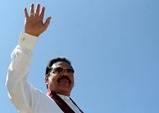 Sri Lanka’s powerful president, Mahinda Rajapakse, vowed to turn his battle-scarred nation into the economic "wonder" of Asia as he was sworn in Friday for a second six-year term.
Sri Lanka’s powerful president, Mahinda Rajapakse, vowed to turn his battle-scarred nation into the economic "wonder" of Asia as he was sworn in Friday for a second six-year term.
At a ceremonial inauguration that included a march-past by thousands of troops, Rajapakse said his handling of the economy would replicate his military success in defeating the island’s Tamil Tiger rebels after decades of ethnic conflict.
"When I took over five years ago the country was heading for break up, but today it is a unified nation where terrorism has been defeated," Rajapakse said in a nationally televised address.
"I have full confidence that the young people of this country will make Sri Lanka the wonder of Asia," he said.
Rajapakse, who turned 65 on Thursday, took the oath of office on an open-air stage overlooking the Indian Ocean in the capital Colombo.
He begins his fresh mandate in an unprecedented position of strength following a constitutional revamp two months ago that further extended his already substantial executive powers.
With his personal popularity running high, family members in key government positions, the opposition divided and his only serious political rival in prison, the president’s control over the island republic seems complete.
Brushing off concerns voiced by countries like the United States that his powers pose a threat to Sri Lanka’s democracy, Rajapakse insists they are necessary to rebuild the country following last year’s victory over the Tamil Tigers.
He has unveiled a series of ambitious infrastructure projects, including a 1.5-billion-dollar port in the southern town of Hambantota.
While pursuing development, he has shrugged off attempts by the West to link aid and investment to human rights and turned to countries like Iran, Libya and China for help.
He has also rejected allegations that the army may have been responsible for substantial civilian deaths during its final offensive against the Tamil Tigers.
The central bank expects Sri Lanka’s economy to grow 8.0 percent in 2010, up from 3.5 percent last year, and Rajapakse has promised to double GDP per capita to 4,000 dollars by the end of his second term in 2016.
Political analyst Paikiasothy Saravanamuttu said the sharp focus on economic recovery would leave the issue of reconciliation with the island’s Tamil minority on the backburner.
"Any talk about political reform is considered irrelevant at best and subversive at worst," he said.
Security was tight for Friday’s inauguration, which came 10 months after the president’s re-election victory in January’s presidential polls.
Rajapakse had called the election two years early to take advantage of soaring approval ratings in the wake of the Tamil Tigers’ defeat.
The Supreme Court ruled that his inauguration should be delayed until the anniversary of his initial November 2005 presidential win.
Apart from being president and commander-in-chief, Rajapakse is also the minister of finance, ports and aviation and highways.
His elder brother Chamal is the speaker of parliament, younger brother Basil the economic development minister and another brother, Gotabhaya, the powerful defence secretary.
Rajapakse’s main political rival, former army chief Sarath Fonseka, is currently serving a 30-month jail sentence after a court martial found him guilty of military procurement offences.
(For updates you can share with your friends, follow TNN on Facebook and Twitter )
